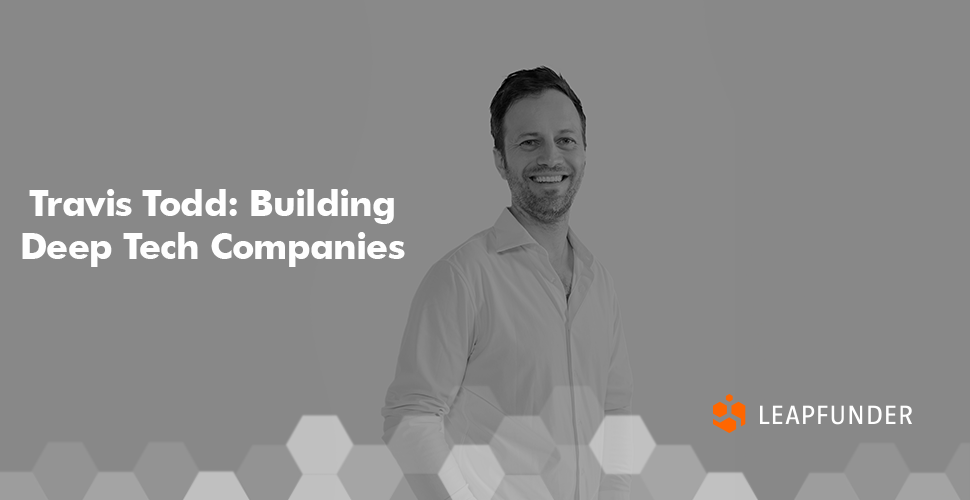Travis Todd Co-Founded Silicon Allee in 2011 to support international early-stage entrepreneurs in Berlin. They’ve expanded this mission with Fraunhofer Heinrich Hertz Institute HHI to transition technology out of research and academia into the startup sector in a better way. Find out why he’s giving his time, money, and opinions to Berlin’s most impactful early-stage entrepreneurs, and check out what it is about deep tech companies that particularly attracts him.

1. Hi Travis, thank you very much for agreeing to do the interview. Tell us about your background and connection to the startup world.
I’m from the US and I studied graphic design in university. But I’ve been coding since 1994 when my family got their first dial-up modem, so I was always a designer with a development background. I worked in advertising for a little while after university and started my first startup in 2007 when I moved to Berlin.
Since then, I founded a few other companies, so I’ve been through the entrepreneurial cycle, and for the past seven years, I’ve been trying to give back to the ecosystem. My biggest accomplishment has been Co-Founding Silicon Allee in 2011. It started as an organization that supports international entrepreneurs in Berlin and has grown to become my full-time job.
2. Besides Co-Founding Silicon Allee, you’re the Venture Architect at Fraunhofer Heinrich Hertz Institute HHI and an Investor. Could you tell us about your mission?
Silicon Allee’s mission has always been to support international early-stage entrepreneurs in Berlin in a variety of ways. We ran an incubator called Berlin Founders Fund for about four years and had great success incubating 35 companies; with 65 founders (50-50 male-female split, and about 15% minority founders).
Since last summer, we’ve expanded this mission with Fraunhofer Heinrich Hertz Institute HHI because involving academia was the last nut to crack. The goal is to transition technology out of research and academia into the startup sector in a better way. We were lucky enough to find a partner like Fraunhofer Heinrich Hertz Institute HHI which is one of the most well-funded out of the 76 Fraunhofer Institutes and has very innovative management that supports our mission to create more startups out of academic research.
3. What is it about deep tech startups that particularly attracts you?
Deep tech is where the real innovation happens. These are the businesses the future will be built upon. They’re the backbone and the infrastructure of the future and the sci-fi nerd in me loves this stuff.
Due to geopolitical reasons, Europe wants more control over its supply chains and technology resources – it wants to be a bit more independent from China and the US – hence the increased need for deep tech companies.
4. After years of working with early-stage entrepreneurs, which advice would you share with founders reading this interview?
Founders are often hesitant to get out and talk to people about their ideas. The best thing you can do as an early-stage entrepreneur is to get out there and pitch your idea to as many people as possible. That’s how you increase the possibility of someone getting excited about your idea and joining the ride. Even if you haven’t written one line of code yet, the best thing you can do is get out there and talk to people about your passion.
The next advice is to talk to customers early on. Get feedback as soon as possible. A lot of time, technical Co-Founders just keep developing feature after feature because they think the next feature will be the one that helps them make it. Talk to customers early on and figure out what features are most important to them instead of developing more without customer feedback.
Lastly, the most important advice I give early-stage founders about funding is to try and do their homework and understand how VC funds are built, managed, and run. They should understand the VC industry like they understand their industry. A lot of founders think all investors are the same. And they waste a lot of time talking to investors who won’t invest in their company. Investors are savvy, they’re going to take all the meetings they can because they don’t want to miss out on anything. So before you even take the first meeting, ask the investors bluntly about when they closed their fund, how much it was, and whether they’re investing at the moment.
5. What do you predict for the startup ecosystem in Berlin? What are the challenges and the opportunities the ecosystem is facing?
Berlin is a semi-mature ecosystem. There are a lot more professional services and infrastructure than before. In my opinion, it’s just as active as before the pandemic and the financial situation that has disrupted all ecosystems worldwide over the last couple of years. There will always be opportunities in the Berlin tech sector.
The current challenge for Berlin as an ecosystem is that it’s getting expensive. Its major selling point was the cheap rents and now it’s the most expensive city in Germany. So if we’re losing soft factors such as quality of life and cost of living, the ease of doing business needs to improve. And doing business in Germany is not easy, whether it’s setting up companies, shutting them down, or managing them. The government is aware of all these problems and is working on them so that’s a first step in taking the ecosystem to the next level.
Currently, there’s this huge push for deep tech. Throughout next year, we’ll see if Berlin can develop deep tech companies. I’m hoping that as the financial markets stabilize after the inflation we’ll start seeing more exits. I’d love to see more companies from Berlin with a unicorn status that can start giving back to the ecosystem.
Thank you very much for sharing your story and views with us. We wish you the best of luck in your future endeavors.
Join our network of startups & investors!

